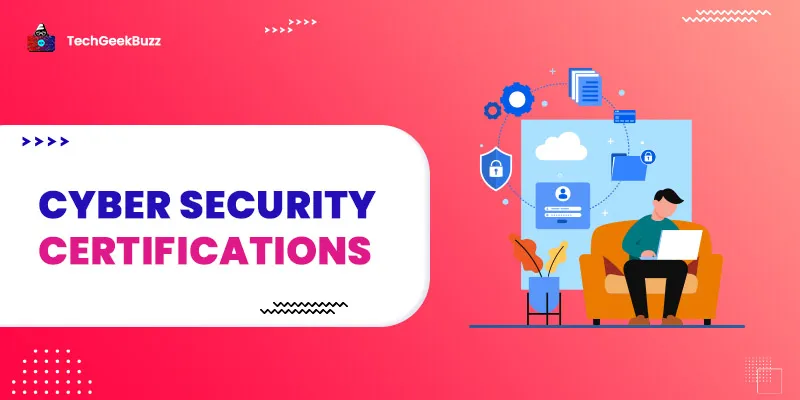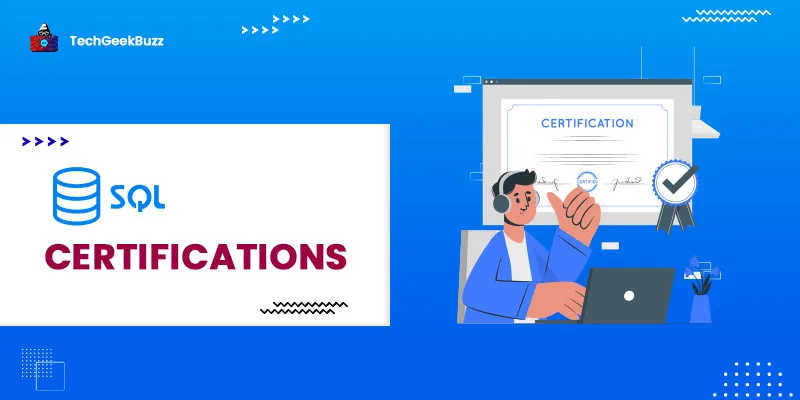Cybersecurity has become a concern for both companies and individuals. As a result, there is a growing demand for cybersecurity experts. Here are some of the best Cyber Security Certifications for beginners. Do you want to improve the cybersecurity of the computer network at your home or workplace? Or you're an employer who is looking to improve your company's security and educate your employees on the subject. Or maybe you're thinking about pursuing a career in cybersecurity and aren't sure where to begin.
Whatever your reasons are for learning about cybersecurity, there's likely to be an online course that will suit your needs. However, there are so many options to pick from that it might be difficult to make a decision, and that's why we've compiled a list of the best online cybersecurity courses that you can trust.
What is Cyber Security?
The process of safeguarding computers, servers, portable devices, electronic systems, networks, and data from harmful and malicious attacks is known as cyber security . It's also known as electronic information security or information technology security. The phrase is used in a range of contexts, ranging from corporate to mobile computing. Here are some of the key activities that come under cyber security :
- Protecting systems from unauthorized access from third parties.
- Enhance information security and business continuity management.
- Increasing consumers' trust in the information security arrangements.
- Changing and optimizing the company's credentials from time to time.
- In the event of a breach, make recovery as fast as possible.
Responsibilities of Cyber Security Expert
1. Network security
It refers to the process of protecting computer networks from intruders, whether they be intentional hackers or opportunistic malware.
2. Application security
A cyber security expert focuses on preventing malware from infecting software and devices. A hacked application could allow access to the data it was supposed to secure.
3. Operational security
Developing procedures and strategies for handling and protecting data assets is another major responsibility of a cyber security professional. The protocols that dictate how and where data may be kept or exchanged as well as the permissions users have while accessing a network, all fall under this.
4. Disaster recovery and business continuity
A cyber security professional specifies how a company reacts in the case of a security breach or any other event that results in the loss of data or information. Disaster recovery policies define how an organization returns operations and data to the same operational capabilities as before the disaster. Business continuity is the plan that an organization uses when it is unable to operate due to a lack of resources.
5. End-user education
By failing to follow appropriate security measures, anyone can unintentionally introduce a virus into an otherwise protected system. It is critical for every organization's security team to teach users to delete suspicious email attachments, not plug in unrecognized USB drives, and various other good security practices.
10 Best Cyber Security Certifications
1. The Complete Cyber Security Course for Beginners: Hackers Exposed (Udemy)
Cybersecurity is unquestionably one of the most in-demand careers today. This course is intended for beginners and covers the fundamentals of cybersecurity. Through threat modeling and risk assessment, you'll get a sense of the dangers and vulnerabilities that exist. The course enables you to begin with cybersecurity basics and work your way up to more advanced concepts.
Explore the darknet to gain a better understanding of cybercriminals' mindsets, as well as global tracking and hacking infrastructures. You will be able to secure data, systems, and personal identity after the completion of the classes.
Features
- It is a thorough and easy-to-understand course that is suitable for students of all levels of experience.
- Attend a crash course on encryption that teaches you how to get around it and reduce the risks.
- Master the art of phishing, identity theft, vishing, and other forms of social engineering.
- Learn how to improve security by isolating and internalizing physical and virtual environments.
- Work on the exercises and quizzes to see if you understand the material.
- Comes with 123 video lectures, 1 article, and 1 downloadable resource.
2. Cybersecurity for Managers (MIT Management Executive Education)
This cybersecurity course is specifically oriented toward individuals in managerial positions in an organization. It covers the core principles of how managers may contribute to the company's cybersecurity. The course starts by identifying the different categories of potential threats and ranking them in order of importance.
It will help you learn how to improve security and foster an ethical and cybersecurity culture in the workplace. By the end of this course, you'll know how to deal with various risks and hazards and develop a solid action plan.
Features
- To help clarify the ideas, the course presents examples from diverse industries like manufacturing, telecommunications, and insurance.
- Learn about the security frameworks of the firms featured in the case studies.
- Examine organizations’ cybersecurity processes and impediments from a strategic standpoint.
- Learn the technical language you'll need to communicate in this field.
3. Professional Certificate in Cybersecurity Executive Education
This cyber security certification course is intended to help you enhance your career as a cybersecurity engineer in any company. By enrolling in this program, you will learn skills that help you to protect confidential data and computer systems, networks, and cloud applications against cyberattacks. It focuses on broadening your understanding of both defensive and offensive parts of technology while also teaching key cybersecurity principles.
Also, you will receive personalized comments from course instructors, as well as insights from special guests, mentors, and career coaches. You would have the option of building a capstone network development project at the end of the course, which will help you strengthen your resume.
Features
- Early-career IT professionals, network engineers, and system administrators will benefit from this well-organized learning resource.
- Learn how to strengthen your organization's server security against cyberattacks while also discovering flaws.
- Learn about the fundamentals of cybersecurity as well as federal government rules, operations, and standards, and identity and access management ideas.
- Develop a solid basis for industry certifications like CompTIA Security and CISSP.
4. Post Graduate Program in Cyber Security
MIT's Schwarzman College of Computing is well-known for teaching computer-related subjects. This professional certification program is intended to assist you in gaining the latest skills required in the constantly expanding sector of cybersecurity.
The curriculum, developed by MIT Schwarzman College of Computing, will teach you how to safeguard your infrastructure and secure your data using a variety of methodologies.
It is suitable for anyone who wishes to develop their technical and programming abilities in order to deal with security concerns. You'll get access to video lessons, business case analysis, the EC-council training kits, 25+ hands-on assignments, and more with this cyber security certification course.
Features
- Live masterclasses from MIT faculty members; they will walk you through the whole course and teach you the fundamentals as well as advanced concepts related to cybersecurity.
- Know how to configure and install security software, devices, and networks, as well as the necessary skills to do so.
- With widely accepted security standards, get skills in establishing the architecture and constructing, designing, and maintaining a secure business environment for your company.
- A capstone project, which would be the final step in this learning path, will teach you how to tackle real-world, industry-aligned challenges.
5. The Complete CS Course: Network Security!
If becoming a cybersecurity professional is what you want, this course will help you achieve that. Interestingly, this is one of the best cyber security certifications available online.
After completing the lessons available in this course, you will be able to use hacking techniques and vulnerability scanning to find security weaknesses in the overall infrastructure. Learn about firewalls, wireless security, network monitoring, and other topics.
After that, you'll know how companies can monitor users online and how to deal with search engines and their connected services' privacy difficulties.
Features
- Know about the configuration of firewalls among all the systems and environments.
- Learn how to use passwords, soft tokens, and hard tokens as authentication mechanisms.
- Lessons are dynamic and enjoyable thanks to living examples, assignments, and slides.
- Learn how to set up and design a small network to provide maximum physical and wireless security.
6. Cyber Security Operations: Microcredentials Course
This is yet another popular cyber security certification that covers the objectives of various cybersecurity technologies. You will understand the impact of various security and cryptographic measures on a cybersecurity breach.
The course teaches you how to conduct a cybersecurity investigation using constitutionally defensible procedures. Also, learn how to look into the evidence left behind by a cybersecurity breach. From the perspective of a cybersecurity investigation, understand how to assess current and typical trends.
The course offers a free 7-day trial to students. If students want to keep taking classes, then they can sign up for a monthly subscription. The curriculum is designed for students at the postgraduate level.
Features
- After finishing the program, you will earn a cybersecurity certificate that attests to your knowledge of the subject.
- Learn from a variety of hands-on activities, video lectures, and articles.
- You can test your understanding of the subjects in the course by participating in online exams.
- See your course progress through the Progress Page.
- Cisco Networking Academy has given its approval for this master’s program
7. Cybersecurity Training for Business Specialization
This cybersecurity certification for business is created by the University of Colorado to safeguard small and large organizations from cyber attacks. The course will teach you how to analyze the practical parts of computer security, identify potential dangers to your company, and secure your data and systems.
Greg Williams is the instructor for this course, and the whole course is broken down into four sections: Introduction to Cybersecurity for Business, Cyber Threats and Attack Vectors, Detecting and Mitigating Cyber Threats and Attacks, and Proactive Computer Security.
Features
- The course includes a project to help you put what you've learned into practice.
- Offers a certificate of completion.
- Coursera encourages peer-to-peer learning so that you can learn and share experiences with co-learners.
- Everyone from system administrators to middle management to senior corporate leaders can benefit from this online course.
- If you don't want to attend the complete program, you can also opt to enroll in particular classes only.
8. Cyber Security Foundations: Start Building your Career in Cyber Defense
This comprehensive course is designed to improve your cybersecurity knowledge and awareness. It covers a wide variety of topics, including data security, data restoration, identity and access management, cybersecurity, data protection, anti-malware, and ransomware protection. Pertaining to cybersecurity, you'll learn about the fundamental principles, issues, threats, vulnerabilities, risk, attacks, and their results.
The course is created in partnership with the EC Council, which is the world's leading technical certification body for cybersecurity. Additionally, you'll receive a professional certificate of completion signed by the EC Council right after completing the course.
Features
- Building cyber resilience in your organization will teach you how to predict, respond to, and recover from cyber-attacks.
- Learn about the importance of cybersecurity, the most frequent types of cyberattacks, and how to establish organizational cyber resilience to protect your company from various cyberattacks.
- Learn how to use identity and access management to safeguard and protect sensitive data.
- Real-life practical examples, case studies, quizzes, and practical assignments will help you apply what you've learned to real-world challenges.
- You can discuss cybersecurity threats and their consequences with your professors.
9. The Complete CS Course: End Point Protection
This cyber security certification includes all of the major operating systems' endpoint protection methods. Understand how to deploy disc strong encryption, next-generation anti-virus solutions, and detect different types of threats.
The course concludes with a discussion of email and messenger security. It discusses various ideas to overcome flaws and ensure complete communication security. This certification is quite popular with over 68,4912 students enrolled for it.
Features
- It covers all of the technologies that endpoint protection software has to offer.
- Sheds light on diversion and identification techniques used to detect and monitor threats such as malware and hacker attacks.
- Learn about application control, execution prevention, machine learning , and artificial intelligence as well.
- Learn how to use anti-forensics techniques to securely destroy data that is unrecoverable even by computer forensics professionals.
- Get consistent support from the instructor to clear all your doubts.
10. Advanced Cyber Security Training
Considered one of the best certifications for cybersecurity, it can help you gain all the necessary skills required to become a cyber security engineer, such as spotting weaknesses, securing applications, security software testing, and more.
It is suitable for people working in the networking and cybersecurity fields. It includes Advanced Cyber Security instructions on hands-on password attacks, information security, and web application foundations, as well as three other training courses.
The course is created in partnership with the EC Council, so you'll be learning from highly qualified instructors. Moreover, it covers both theoretical knowledge and practical applications of cybersecurity.
Features
- You will learn how to detect, minimize, eliminate, and recover from many types of cyber threats.
- Discover the many first-hand techniques by learning how to build up an effective environment for security testing.
- The course teaches security assessment and penetration testing for securing data against cyber threats.
- Learn about security solutions that can help to improve network security and avoid assaults such as spear phishing.
- Learn about the OWASP Top 10, a standard publication that keeps you informed about the most significant threats to web applications.
Conclusion
Before you jump into the world of cybersecurity, be sure you understand its importance. The two basic instincts that you need to focus on as a cyber security expert are: what you are safeguarding and what will happen if it is not safeguarded.
Pursuing a career in cybersecurity does not have a single entry point. Individuals in different professional roles such as Software Developer, Data Analyst, Database Administrator, Network Administrator, and Web Administrator can also find their way into this field.
However, to become a cybersecurity professional, you must develop a solid understanding of various relevant technical procedures, which you can do by enrolling in a cyber security certification program. Also, rather than starting as a newcomer to this field, you can start as a typical IT professional and work your way up to become a cyber security expert.
People are also reading:
- Best Ethical Hacking Books
- Best Hacking Tools
- Online Tools To Scan Website Security Vulnerabilities & Malware
- Top Website Malware Scanning Softwares for Developers
- HTML Certifications to Become a Web Developer
- Best Java Certifications to Boost Your Career
- Most Valuable SQL Server Certifications
- Machine Learning Certifications to Get in 2022
- Top 5 JavaScript Certifications in 2022
- Best Linux Certifications




